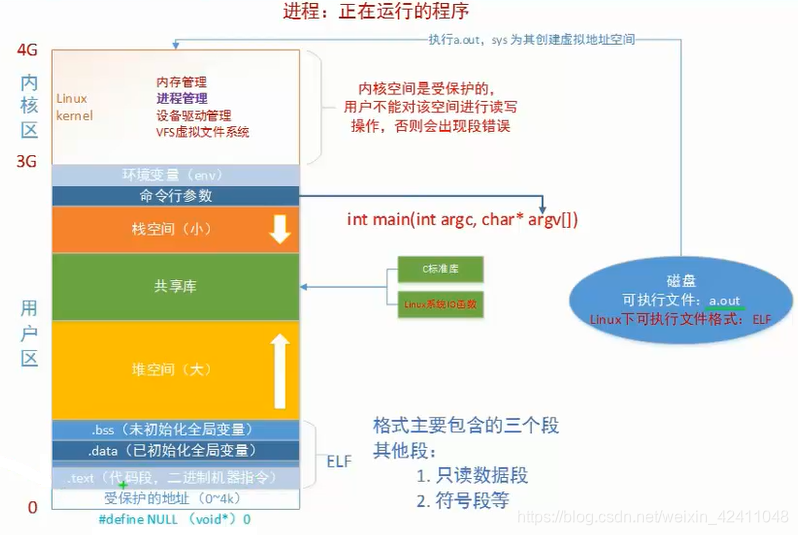系统函数:
调用系统函数,用户空间 -> 内核空间
系统API:
应用层:fopen
系统层:open
内核:设备驱动函数
FILE *fp.
fp 为一个结构体的指针,结构体中包含打开文件的各种属性。
打开文件 --> 写入IO缓冲区 --> 磁盘
虚拟地址空间:
程序运行起来后,磁盘上都会有一个虚拟地址空间,在数据处理的时候会通过MMU(内存管理机制)把虚拟地址空间映射到物理内存上进行处理。

进程管理:
PCB(一个400多行的结构体)进程管理控制块中的文件描述符标,文件描述符表前三个默认打开stdin stdout stderr.
 fork函数理解:
fork函数理解:
子进程被创建后,父子进程的执行顺序是CPU自己调度的。
在fork后shell终端是不知道创建了一个子进程,如果当父进程先于子进程执行结束,shell发现进程结束会直接从后台切换到前台运行,这时子进程数据输出就会错乱。


如上图,fork后,子进程会完全拷贝一份父进程,但它只会从fork处接着往下执行
读时共享,写时复制:
建立全局变量是不可以实现进程间通信的,如下图理解。

man man ==》可以查看函数手册位于man的第几章
open()
注意:
创建文件时,文件权限为:mode & ~umask,man中有详细描述,详见手册。
write()
read()
off_t lseek(int fd, off_t offset, int whence); //移动文件指针
whence:
SEEK_SET
SEEK_CUR
SEEK_END
lseek(fd, 0, SEEK_SET); //文件指针移动到文件头,返回值为0
lseek(fd, 0, SEEK_CUR);// 返回文件指针的当前位置
lseek(fd, 0, SEEK_END);//文件指针移到文件尾,返回文件大小
lseek文件拓展:
lseek(fd, 1000, SEEK_END);//在原文件大小的基础上再增加1000byte。
write(fd,“a”, 1); //要最后再写入一个字符才能拓展成功。
/*********************写操作****************************/
#include <stdint.h>
#include <string.h>
#include <errno.h>
#include <sys/types.h>
#include <sys/stat.h>
#include <fcntl.h>
#include <unistd.h>
int main()
{
int file_handle;
ssize_t write_num;
char ch[] = "These red roses are for you!";
file_handle = open("./hell.txt", O_WRONLY);
if(file_handle < 0)
{
printf("open:%s", strerror(errno));
return file_handle;
}
write_num = write(file_handle, ch, strlen(ch));
if(write_num < 0)
{
printf("write:%s", strerror(errno));
return file_handle;
}
if(0 > close(file_handle))
{
printf("close:%s", strerror(errno));
}
else
{
printf("success\n");
}
}
/*******************************************************************/
****************************读文件操作***********************************/
#include <stdint.h>
#include <string.h>
#include <errno.h>
#include <sys/types.h>
#include <sys/stat.h>
#include <fcntl.h>
#include <unistd.h>
int main()
{
int file_handle;
ssize_t read_num;
int count = 0;
char prin[1024] = "0";
char ch[8];
file_handle = open("./hell.txt", O_RDONLY);
if(file_handle < 0)
{
printf("open:%s", strerror(errno));
return file_handle;
}
while(1)
{
read_num = read(file_handle, ch, sizeof(ch));
if(read_num < 0)
{
printf("read:%s", strerror(errno)); //perror(“open”)
return file_handle;
}
if(read_num == 0)
{
break;
}
}
if(0 > close(file_handle))
{
printf("close:%s", strerror(errno)); //perror("close")
}
else
{
printf("success\n");
}
}
printf("data:%s\n", prin);
/**********************************************************/